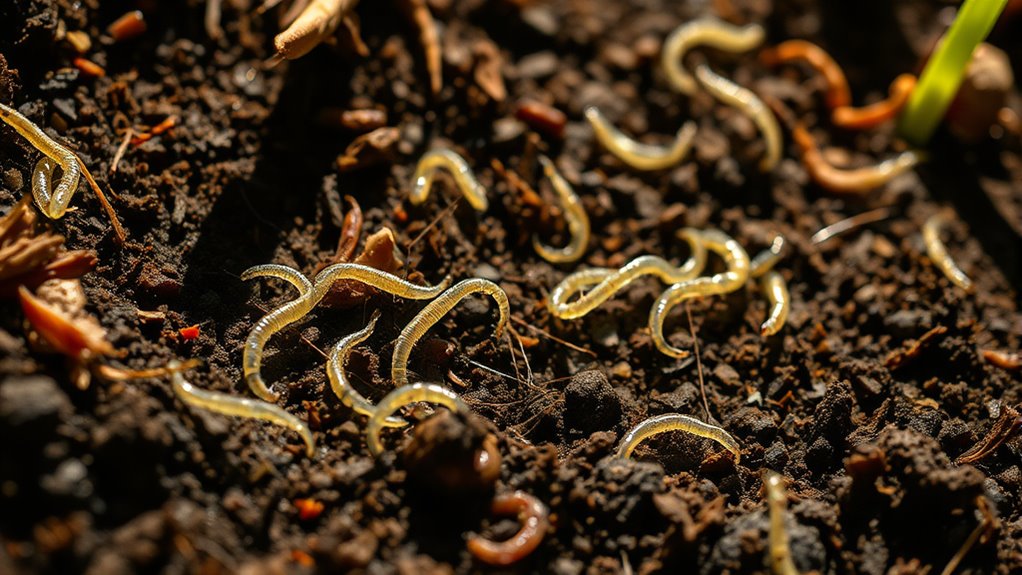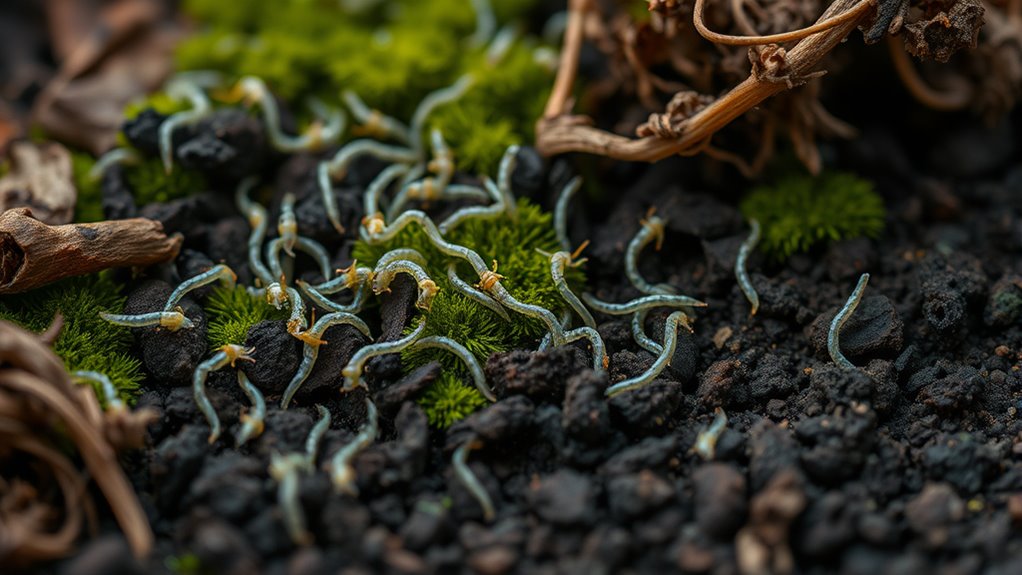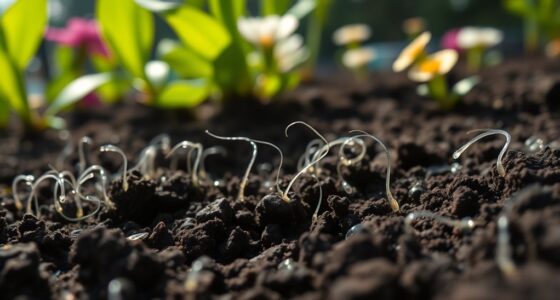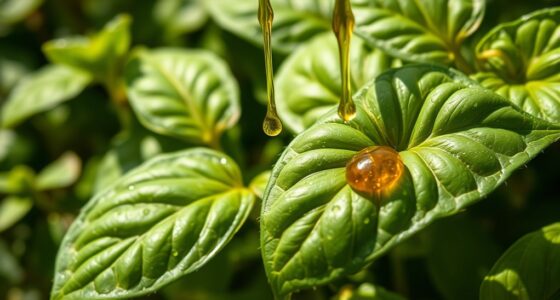Beneficial nematodes are your garden’s natural bodyguards, working silently beneath the soil to target pests like grubs and beetles. These microscopic worms are eco-friendly and won’t harm beneficial insects or pollute the environment. By releasing bacteria that kill pests quickly, they promote healthier, more resilient plants. Applying them during peak pest activity and maintaining moisture maximizes their effectiveness. Keep going to discover how these tiny allies can transform your garden’s health and balance.
Key Takeaways
- Beneficial nematodes are microscopic worms that naturally target and kill soil-dwelling pests like grubs, beetles, and root maggots.
- They promote a healthy soil ecosystem by controlling pests without harming beneficial insects or polluting the environment.
- Apply nematodes during peak pest activity, ensuring soil moisture and proper timing for maximum effectiveness.
- These nematodes work underground, seeking out pests and releasing bacteria that kill them within days.
- Using beneficial nematodes reduces the need for chemical pesticides, supporting sustainable and resilient garden health.

Beneficial nematodes are microscopic worms that naturally control soil-dwelling pests, making them an eco-friendly alternative to chemical pesticides. When you introduce these tiny allies into your garden, you’re taking a smart step toward sustainable pest control. Unlike chemical options that can harm beneficial insects and pollute the environment, beneficial nematodes target specific pests like grubs, beetles, and root maggots without disturbing other soil life. This precision helps you maintain a more balanced soil ecosystem, which is essential for healthy plant growth. By reducing pest populations naturally, you also prevent the damage pests can cause to your plants, ensuring a more vibrant and productive garden.
Beneficial nematodes naturally control soil pests, promoting eco-friendly and balanced garden health.
Using beneficial nematodes enhances soil health in several ways. First, they promote a natural biological cycle by preying on pests that often feed on roots and underground parts of plants. When pests are kept in check, plants can absorb nutrients more efficiently, leading to stronger growth and better yields. Additionally, because nematodes are living organisms that reproduce in the soil, they create a self-sustaining pest management system that continues to work over time. This ongoing activity reduces the need for repeated interventions, saving you time and money while fostering a healthier soil environment.
Applying beneficial nematodes is straightforward, and timing is key. You typically want to introduce them when pest activity peaks, such as early spring or late summer, and ensure the soil is moist during application. You can purchase them in a powder or liquid form, which you mix with water before spreading over the affected areas. It’s best to water the soil beforehand and apply the nematodes during evening or cloudy conditions to prevent UV damage, which can kill these delicate worms. Once in the soil, they actively seek out their prey, burrowing into pests and releasing bacteria that kill them within a few days. Their effectiveness depends on consistent moisture and proper distribution across the affected zones.
Incorporating beneficial nematodes into your pest control strategy not only reduces your reliance on chemicals but also supports overall soil health. They work silently beneath the surface, targeting pests where they hide, and in doing so, help create a more resilient and balanced garden ecosystem. This natural approach empowers you to manage pests responsibly while nurturing the long-term vitality of your soil. As a result, your garden becomes a healthier, more sustainable environment—one where plants thrive, pests are kept in check, and the soil remains rich and productive.
Frequently Asked Questions
Are Beneficial Nematodes Safe for Pets and Children?
You’re wondering if beneficial nematodes are safe for pets and children. Generally, they’re safe because they’re naturally occurring soil organisms that target pests, not humans or animals. For pet safety and child safety, you should follow label instructions and avoid disturbing treated soil immediately after application. When used properly, beneficial nematodes pose minimal risk, making them a safe, eco-friendly solution for pest control in your garden.
How Long Do Beneficial Nematodes Remain Effective After Application?
Ever wonder how long beneficial nematodes stay effective after you apply them? Their application longevity depends on environmental factors like soil moisture, temperature, and sunlight. Usually, they remain active for several weeks, often 2-4, but harsh conditions can shorten this period. To maximize their effectiveness, guarantee consistent moisture and avoid extreme temperatures. With proper care, your garden’s natural pest control can last longer and stay more effective.
Can Beneficial Nematodes Be Used in Organic Gardening?
Yes, beneficial nematodes are suitable for organic gardening because they’re naturally occurring and don’t rely on synthetic chemicals. They help control pests while maintaining your garden’s organic certification standards. Just guarantee your soil compatibility is good, as nematodes thrive in moist, healthy soil. Use them as directed, and they’ll provide effective pest control without compromising your commitment to organic practices.
Do Beneficial Nematodes Affect Beneficial Insects or Pollinators?
Back in the day, folks worried about beneficial insect impact when using nematodes. Rest assured, beneficial nematodes target soil-dwelling pests and don’t harm pollinators or beneficial insects above ground. They’re safe for pollinator safety because they don’t affect bees, butterflies, or other insects that help your garden thrive. You can confidently use them, knowing they’re environmentally friendly and won’t disrupt your garden’s natural balance.
What Environmental Conditions Optimize Nematode Effectiveness?
To optimize nematode effectiveness, you need to take into account soil moisture and temperature calibration. Keep the soil consistently moist, as nematodes thrive in damp conditions, ensuring they can move and infect pests. Maintain soil temperatures between 55°F and 85°F for best results, as extreme temperatures reduce their activity. Regularly calibrate your soil thermometer to monitor conditions accurately, creating an ideal environment that boosts nematode performance against pests.
Conclusion
So, next time you see those tiny nematodes lurking in your soil, remember—they’re your garden’s unsung heroes, quietly battling pests without a fuss. Who needs harsh chemicals when these tiny bodyguards do all the dirty work? Embrace your new backyard army—low-maintenance, eco-friendly, and secretly plotting to keep your plants pest-free. After all, sometimes the smallest defenders pack the biggest punch, proving that true strength comes in tiny, beneficial packages.









